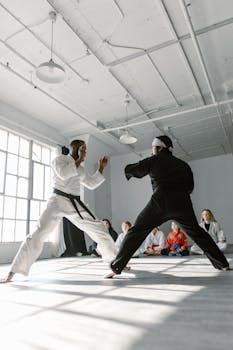
Image by RDNE Stock project on Pexels
A Brief History of Judo Uniforms
Judo uniforms have been an integral part of judo since its inception in the early 20th century. The first judo uniform was designed by Hironori Otsuka, a Japanese judoka who is considered one of the founders of modern judo. Initially, the uniform consisted of only a gi, but over time, other elements such as a headband and belt were added to create a more comprehensive uniform.Construction and Materials
A high-quality judo uniform is made from durable materials that can withstand the rigors of intense training sessions and competition. The main components of a judo uniform include:Gi:
The gi is the core component of the uniform, providing warmth, comfort, and protection for the body.Headband:
A headband is typically attached to the back of the neck and serves as a barrier against sweat and humidity during intense training sessions.Belt:
Judo belts are an essential part of the uniform, used to measure progress in rank and determine eligibility for competition.
Care Instructions
Proper care and maintenance of a judo uniform is crucial to extend its lifespan. Here are some tips:- Wash the gi in cold water with a mild detergent.
- Reshape the gi while it's still damp to prevent wrinkles and creases.
- Dry the gi on a low heat setting or air dry it.
Tradition and Cultural Significance
Judo uniforms hold significant cultural and traditional value within judo communities. The uniform is often seen as a symbol of respect, honor, and commitment to the sport. In many countries, judokas are expected to wear their judo uniforms with pride, reflecting on their heritage and tradition.Benefits and Advantages
Choosing the right judo uniform can make a significant difference in an athlete's performance and overall experience. Here are some benefits and advantages of wearing a high-quality judo uniform:Improved Comfort:
A well-fitting judo uniform provides excellent comfort during intense training sessions, reducing fatigue and allowing athletes to focus on their techniques.Enhanced Performance:
Properly cared for judo uniforms can enhance an athlete's performance by providing the necessary warmth and protection.Tradition and Heritage:
Wearing a traditional judo uniform is a way to connect with one's heritage and cultural roots, fostering a sense of identity and community.
Types of Judo Uniforms
There are several types of judo uniforms available, catering to different needs and preferences:Traditional Uniform:
A classic combination of gi, headband, and belt.Modern Uniform:
A variation with additional features such as pockets, trim, or special colors.Customization:
Some manufacturers offer customization options for personalized uniforms.
Conclusion
In conclusion, judo uniforms are an essential part of the judo martial art. By understanding their history, construction, care instructions, tradition, and benefits, athletes can make informed decisions about which uniform is best suited to their needs. Whether you're a seasoned judoka or just starting your judo journey, choosing the right judo uniform can make a significant difference in your performance and overall experience.Frequently Asked Questions
- Q: What are some essential features of a high-quality judo uniform?
- Q: How often should I wash my judo uniform?
- Q: Can I customize my judo uniform?
For more information about Unconventional Martial Arts: Exploring the World of Capoeira and its Cultural Significance, visit https://www.mykaratestore.com/judo-gi-judo-uniforms/ from myKarateStore.